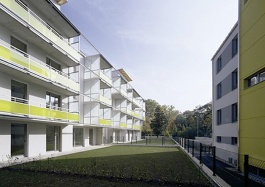
Bartoš does not expect that the government would not release funds for the construction of affordable housing
 |
Fiala told ČTK this afternoon that he does not question the importance of enabling young people to obtain housing and have the prospect of living in one. He identified the construction of more apartments as a key path. "And to be able to build, we need to shorten the construction process," said the Prime Minister. According to him, it is necessary for digitalization to function effectively and to eliminate problems associated with its implementation. "I think we should focus much more on that. And this would truly help our citizens to have more apartments available," Fiala added. He noted that adjustments to the budget between individual departments are possible, but if the government wants to add funds somewhere, it will be necessary to reduce them elsewhere.
The unavailability of housing, according to Bartoš, is the most resonant problem across generations. He believes that construction could also be beneficial for the budget as a whole since the program is returnable in investment terms. "At the same time, the government has already approved these funds once when we set up the program for post-COVID recovery with the European Commission, including the parameters of the program, and cities and municipalities are already preparing these projects for their citizens. Therefore, they should be in the budget; they probably 'wandered' elsewhere," he stated.
According to the draft prepared by the Ministry of Finance, MMR's expenditures in 2025 should amount to 13.3 billion crowns. Compared to this year, they should drop by nearly 13 percent, or two billion crowns, which would be the largest decrease among all ministries. Bartoš stated on Sunday that the budget proposal is not acceptable for the coalition Pirates and calls for an increase in expenditures for the construction of affordable housing by seven billion crowns.
Expenditures for the affordable housing program next year are expected to be around one billion crowns. Compared to this year, it should decrease by approximately 37 million crowns, and nearly the entire amount is to come from SFPI subsidies. Although the proposal for this year's budget similarly allocated the same amount for affordable housing as for 2025 from the state budget, the SFPI budget was subsequently increased by 4.38 billion to 6.32 billion crowns thanks to the affordable housing program. The reason was that the approved budget for 2024 did not include expenditures for subsidized loans to support construction.
Support for affordable housing from SFPI is to be directed toward the construction of rental apartments and can be used for new constructions, renovations, or extensions. Part of the funds can be used immediately for a maximum of 40 percent of costs upon meeting specific requirements. The subsequent subsidized loan at the EU base rate for the Czech Republic, reduced by up to three percentage points, can cover up to 65 percent of the project price. In total, grants and favorable loans could cover up to 90 percent of the investment. The repayment period is up to 30 years, and early repayment is fee-free. Territorial self-governing units, state-funded organizations, or religious institutions can apply for it.
Subsidized affordable housing is intended for four target groups. The income category includes all households except the 20 percent wealthiest. Interested individuals in the target group must not own any properties intended for housing. The next group consists of young people under 35 years old who are also not among the top ten percent wealthiest. The third group includes public service professions, such as healthcare workers or social workers. The last group consists of victims of domestic violence.
The English translation is powered by AI tool. Switch to Czech to view the original text source.
0 comments
add comment
Related articles
0
16.04.2025 | Experts welcome the adoption of the housing support law, they wanted a more progressive form
0
07.02.2025 | Support for the construction of affordable housing has been requested by 92 projects for CZK 5.1 billion
0
26.10.2024 | About the funding for the construction of affordable housing, 70% of municipalities are interested
0
25.07.2024 | The government approved a program to support investments in affordable housing
0
12.06.2024 | The government approved the law on housing support, which is meant to protect people at risk of housing distress
1
17.05.2024 | Bartoš believes that the government will ultimately approve the housing support law
0
30.04.2024 | MMR will allocate an additional 400 million CZK for processing documentation for affordable housing
0
24.05.2023 | The Housing Support Act will go into public consultation next week
0
26.11.2021 | Program dostupného bydlení není pro Prahu použitelný, řekl Hřib
0
26.06.2019 | Czechia is collecting signatures for setting rules for affordable housing in the EU












